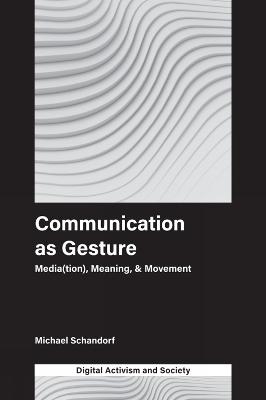
Communication as Gesture
Media(tion), Meaning, & Movement
Seiten
2019
Emerald Publishing Limited (Verlag)
978-1-78756-516-6 (ISBN)
Emerald Publishing Limited (Verlag)
978-1-78756-516-6 (ISBN)
This book critiques current assumptions about 'communication', particularly digitally mediated communication, by re-examining conceptual foundations in rhetoric, linguistics, semiotics, information theory, and cybernetics. The result is a dimensional account of interaction that is at once both intuitive and revolutionary.
While the concept of communication has long been bound to a reductive model of the exchange of information, very few scholars of communication would argue that these assumptions are realistic, without a long list of qualifying caveats. But the concept of communication, built from the integration of semiotic signification with the idea of information as the 'carrier' of transmitted meaning, is so deeply ingrained and simple that even displacing it can seem futile, if not absurd. Nevertheless, these foundational assumptions tightly constrain the ways in which any interactional phenomena can be conceived--and constraints upon our ways of understanding communication drastically limit our capacity to understand our worlds and the social processes that generate them, at any scale or level of abstraction.
Communication as Gesture traces the concept of communication from its roots in classical rhetoric to its integration in structural linguistics, semiotics, information theory, and cybernetics, integrating perspectives from contemporary rhetorical theory, relational psychology, interactional sociology, philosophy, cognitive linguistics, discourse studies, multimodal semiotics, and more. Because so much of our contemporary world is lived with and through digital media technologies, the study of new media and social media provides a rich illustration of the constraints imposed by our reductive assumptions--and hints at the possibilities generated by rethinking them. The gesture theory of communication introduced presents a dimensional account of communication that is intuitively accessible and theoretically rich while overturning reductive assumptions of the linear character of interaction.
While the concept of communication has long been bound to a reductive model of the exchange of information, very few scholars of communication would argue that these assumptions are realistic, without a long list of qualifying caveats. But the concept of communication, built from the integration of semiotic signification with the idea of information as the 'carrier' of transmitted meaning, is so deeply ingrained and simple that even displacing it can seem futile, if not absurd. Nevertheless, these foundational assumptions tightly constrain the ways in which any interactional phenomena can be conceived--and constraints upon our ways of understanding communication drastically limit our capacity to understand our worlds and the social processes that generate them, at any scale or level of abstraction.
Communication as Gesture traces the concept of communication from its roots in classical rhetoric to its integration in structural linguistics, semiotics, information theory, and cybernetics, integrating perspectives from contemporary rhetorical theory, relational psychology, interactional sociology, philosophy, cognitive linguistics, discourse studies, multimodal semiotics, and more. Because so much of our contemporary world is lived with and through digital media technologies, the study of new media and social media provides a rich illustration of the constraints imposed by our reductive assumptions--and hints at the possibilities generated by rethinking them. The gesture theory of communication introduced presents a dimensional account of communication that is intuitively accessible and theoretically rich while overturning reductive assumptions of the linear character of interaction.
Michael Schandorf is Lecturer in Arts Studies in Research and Writing at the University of British Columbia. His research and scholarship focuses on the ways in which people make meaning, and the social and political implications of those processes.
Introduction Chapter 1. Digital Discourse
Chapter 2. Information & Meaning: The Semiotics of Cybernetics
Chapter 3. Making Meaning: Putting Space in Place
Chapter 4. Rhetoric as the Making of Meaning
Chapter 5. Dimensions of Interaction
| Erscheinungsdatum | 11.06.2019 |
|---|---|
| Reihe/Serie | Digital Activism And Society: Politics, Economy And Culture In Network Communication |
| Mitarbeit |
Herausgeber (Serie): Athina Karatzogianni |
| Verlagsort | Bingley |
| Sprache | englisch |
| Maße | 152 x 229 mm |
| Gewicht | 539 g |
| Themenwelt | Geisteswissenschaften ► Philosophie ► Sprachphilosophie |
| Sozialwissenschaften ► Kommunikation / Medien ► Kommunikationswissenschaft | |
| Sozialwissenschaften ► Soziologie | |
| ISBN-10 | 1-78756-516-5 / 1787565165 |
| ISBN-13 | 978-1-78756-516-6 / 9781787565166 |
| Zustand | Neuware |
| Haben Sie eine Frage zum Produkt? |
Mehr entdecken
aus dem Bereich
aus dem Bereich
Aspekte einer Ontologie des Logos
Buch | Hardcover (2024)
Springer Fachmedien (Verlag)
CHF 167,95
Wie die Menschheit zu ihrer größten Erfindung kam
Buch | Softcover (2022)
C.H.Beck (Verlag)
CHF 25,20
Macht und Legitimität politischer Sprache im Prozess der europäischen …
Buch | Softcover (2023)
Nomos (Verlag)
CHF 103,60


